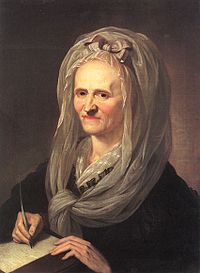
Anna Louisa Karsch
Encyclopedia

Germany
Germany , officially the Federal Republic of Germany , is a federal parliamentary republic in Europe. The country consists of 16 states while the capital and largest city is Berlin. Germany covers an area of 357,021 km2 and has a largely temperate seasonal climate...
autodidact and poet from the Silesia
Silesia
Silesia is a historical region of Central Europe located mostly in Poland, with smaller parts also in the Czech Republic, and Germany.Silesia is rich in mineral and natural resources, and includes several important industrial areas. Silesia's largest city and historical capital is Wrocław...
region, known to her contemporaries as “Die Karschin”.
Life
She came from humble origins, the daughter of an innkeeper , and received no formal education. Her life was marked by poverty and two abusive marriages. Anna showed an early literary talent and learnt to read and write despite opposition by her immediate family. She began to memorise hymns and poems and began writing her own poems to celebrate peasant weddings, funerals and social events. This bought her to the attention of a local teacher who supplied her with works of poetry to study. Her poems appeared in local newspapers in Silesia and she developed a group of followers who were mostly Lutheran pastors and their wives. Her poetic talents grew in the cultural circles of the pastors' houses.During the Seven Years' War
Seven Years' War
The Seven Years' War was a global military war between 1756 and 1763, involving most of the great powers of the time and affecting Europe, North America, Central America, the West African coast, India, and the Philippines...
and the Prussian campaign against Austria in Silesia, Karsch wrote many poems in praise of Frederick, the Prussian King
Frederick II of Prussia
Frederick II was a King in Prussia and a King of Prussia from the Hohenzollern dynasty. In his role as a prince-elector of the Holy Roman Empire, he was also Elector of Brandenburg. He was in personal union the sovereign prince of the Principality of Neuchâtel...
. Her poem “Klagen einer Witwe” caught the attention of the Prussian General, Baron Von Kottowitz and in 1761 she was taken to the court of Frederick the Great by him and there caused a sensation by her ability to form a poem from any words or phrases given to her.
Her natural gifts as a poet stunned her contemporaries and she was given the nickname of "the German Sappho" by her friend and literary advisor Johann Wilhelm Ludwig Gleim
Johann Wilhelm Ludwig Gleim
Johann Wilhelm Ludwig Gleim was a German poet.- Life :Gleim was born at Ermsleben near Halberstadt. Having studied law at the University of Halle he became secretary to Prince William of Brandenburg-Schwedt at Berlin, where he made the acquaintance of Ewald von Kleist, whose devoted friend he...
in 1761. Frederick II agreed to give her a pension and build a house for her but her novelty at court waned and she descended into poverty. On the death of the king she approached his successor, Friedrich Wilhelm II
Frederick William II of Prussia
Frederick William II was the King of Prussia, reigning from 1786 until his death. He was in personal union the Prince-Elector of Brandenburg and the sovereign prince of the Principality of Neuchâtel.-Early life:...
in 1787, and he agreed to fill the promise. A house was built for Karsch, and she lived there, continuing to compose poetry, until her death in 1791. Her memorial is to be seen on the exterior wall of Berlin's Sophienkirche
Sophienkirche (Berlin)
The Sophienkirche is a Protestant church in the Spandauer Vorstadt part of the Berlin-Mitte region of Berlin, eastern Germany. One of its associated cemeteries is the Friedhof II der Sophiengemeinde Berlin.-History:...
.
Gleim published two volumes of her poetry, in 1764 and 1772.
Karsch’s correspondence is often seen as another of her literary accomplishments, particularly her letters to Gleim.
Her daughter Caroline Luise von Klencke became a respected poet and dramatist, and her granddaughter Helmina von Chézy
Helmina von Chézy
Helmina von Chézy , born Wilhelmine von Klencke, was a German journalist, poet and playwright, most famous for writing the libretto for Carl Maria von Weber's opera Euryanthe and the play Rosamunde, for which Franz Schubert provided incidental music.This article uses material from the German...
(1783-1856), born Wilhelmine von Klencke in Berlin, became an author, whose play Rosamunde
Rosamunde
Rosamunde can refer to:* The German name for the Beer Barrel Polka* Music by Franz Schubert:**Rosamunde incidental music**Rosamunde String Quartet **Impromptu in B flat major, Op. 142 No. 3...
(1823) is remembered because Franz Schubert
Franz Schubert
Franz Peter Schubert was an Austrian composer.Although he died at an early age, Schubert was tremendously prolific. He wrote some 600 Lieder, nine symphonies , liturgical music, operas, some incidental music, and a large body of chamber and solo piano music...
wrote instrumental music for it; she was also the librettist for Carl Maria von Weber
Carl Maria von Weber
Carl Maria Friedrich Ernst von Weber was a German composer, conductor, pianist, guitarist and critic, one of the first significant composers of the Romantic school....
's Euryanthe
Euryanthe
Euryanthe is a German "grand, heroic, romantic" opera by Carl Maria von Weber, first performed at the Theater am Kärntnertor, Vienna on 25 October 1823...
.

